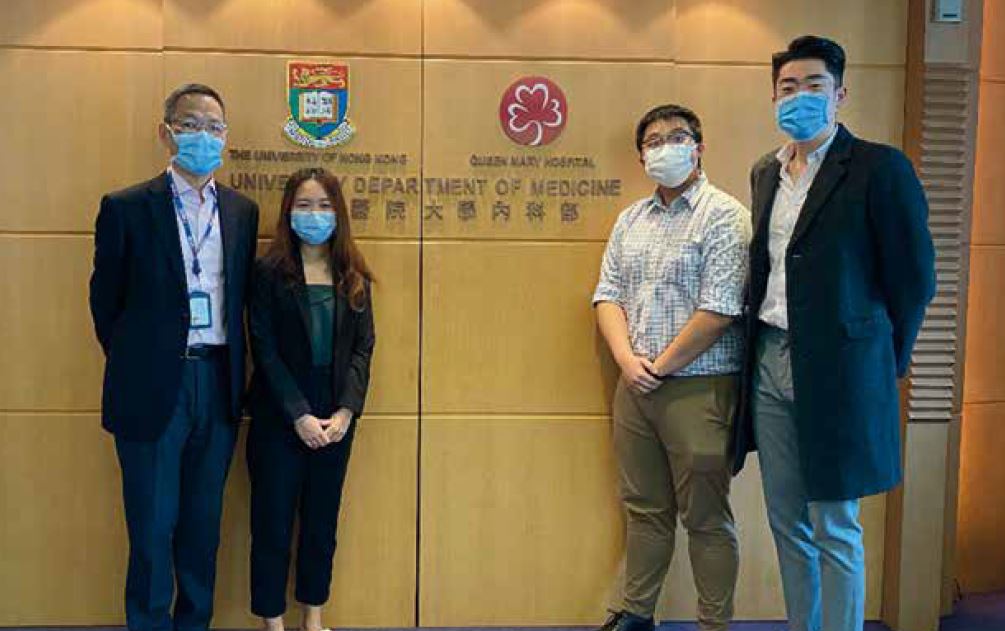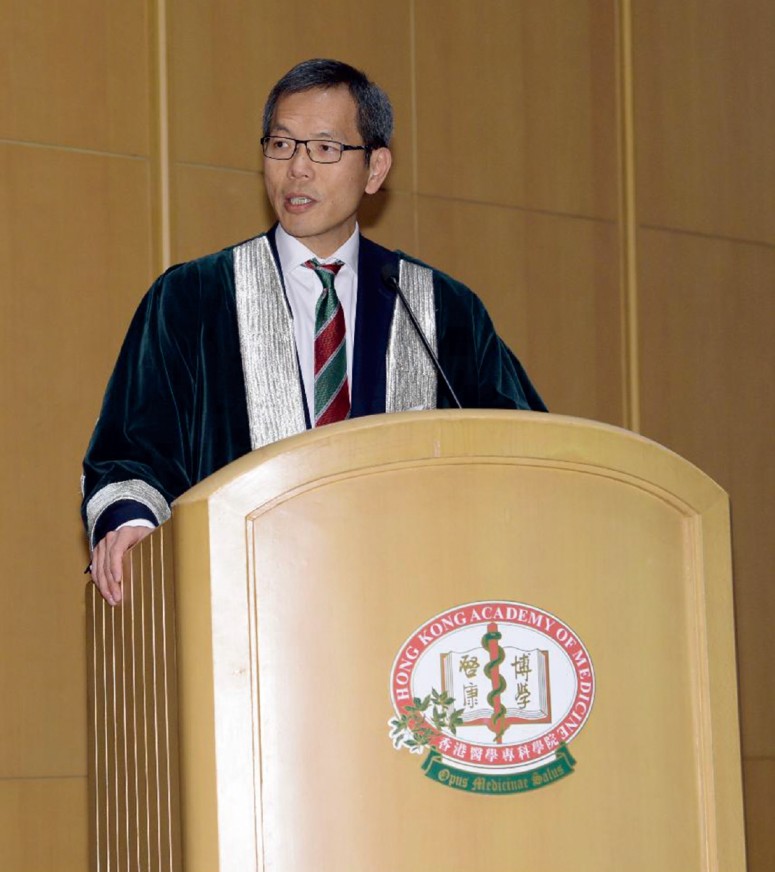© Hong Kong Academy of Medicine. CC BY-NC-ND 4.0
HEALTHCARE FOR SOCIETY
Expertise from experience: an interview with Prof Chak-sing Lau
Henry Evan Cheng1, Man-tsin Lo1, Nathan So1, Oscar Shen2
1 Year 4, The Chinese University of Hong Kong
2 Year 6, The Chinese University of Hong Kong
Prof Chak-sing Lau, the Immediate Past President of
the Hong Kong Academy of Medicine (HKAM), and
a renowned clinician and professor with a storied
career, was invited by the Hong Kong Medical Journal
to reflect on his career and share some thoughts for
the future.
Prof Lau doesn’t like to see himself as a leader;
despite being Chief of Service at the Department of
Medicine at Queen Mary Hospital, he sees himself
as a member of the team, no more important than
any doctor under his team. Everybody has a role to
play in the community, and he only seeks to do his
job to the best of his ability.
Prof Lau has inevitably experienced many of
the challenges that the recent COVID-19 pandemic
has brought upon the Hong Kong community, and
especially the healthcare system. He still firmly
believes that increasing vaccination rates are
imperative to reduce morbidity and mortality from
this pandemic. However, while he remains optimistic,
he admitted underestimating the difficulty of city-wide
vaccination, and also overestimating the ability
of the healthcare profession to persuade people to
get vaccinated.
While the sentiment towards COVID-19 in
the hospitals has not changed significantly, Prof
Lau’s personal views about the strategies that people
employ to cope with COVID have seen some changes.
Doctors have learned to live with COVID-19 on a daily basis; although no single strategy is superior (in
Hong Kong, or internationally), the important thing
is for everyone in the community to work together to
return the world to some normalcy.
One of Prof Lau’s key concerns is the ageing
population in Hong Kong. He remarked that
there are few incentives for new doctors to train
in geriatrics, along with a lack of manpower in
nurses, allied health professionals, and caretakers
within the public system. Hong Kong’s COVID-19
situation has only exacerbated issues; for example,
some of the current restrictions mean that many
elderly inpatients cannot have visitors, which may
exacerbate mental health issues that are already
prevalent in this demographic.
Despite the added strain that COVID has
placed on the public healthcare system, Prof Lau
expressed admiration for his colleagues’ staunch
hard work during the pandemic. He felt touched that
even colleagues who work in the private sector have
reached out and volunteered to help the strained
public services. In this way, he remarked that
COVID has driven people apart, but in some ways it
has brought people together through adversity.
Another pressing problem facing public
healthcare services that concerns Prof Lau is the high
attrition rate among doctors. Many departments
are understaffed, and the only source of manpower
is fresh graduates. Many of these junior colleagues are overwhelmed by the workload, and the steep
learning curve can also be extremely discouraging.
Ultimately this is detrimental for both doctors and
patients, resulting in a poor impression of public
healthcare services from both perspectives. Prof
Lau thinks that a key way to correct this is to show
doctors that they are appreciated; having a say in
what happens and seeing the results is a great way of
improving morale. By building a culture of belonging
and fraternity, doctor retention and satisfaction will
certainly be helped.
Prof Lau has much to say on the past, present,
and future of medical education. He lamented that
medical students these days have too much to learn;
he recognises that it is impossible for students to
know everything, and teachers’ expectations might
need to be regularly revisited in this context. He
thinks that the key to effective education is training
teachers to assess students reasonably, which he
notes is a far cry from his own medical training. He
recalls that his medical school professors were top
clinicians or researchers, but did not know how to
match expectations with students’ abilities. Over his
own time as an educator, he has noted a shift towards
mindful consideration and realistic expectations
of students, but there is still a disparity between
teachers’ expectations and reasonable ability.
Regardless of the limitations in the education
system of his time, Prof Lau said that he paradoxically
misses the stresses of it. He fondly recalled frantically
copying notes from professors’ lectures and trying to memorise everything possible. However, he
cautions students that this is not the optimal way to
learn, and now encourages students to understand
rather than rely on rote memorisation. He also
expressed disappointment that the pandemic meant
many medical students were deprived of clinical
teaching hours and patient exposure and stressed
the importance of patient interaction, emphasising
that everything he knows was learned from his
clinical encounters. He sympathises with new
graduates who may find it extremely tough to begin
practice.
The level of burnout among healthcare workers
has reached an all-time high in recent years. The key
to preventing burnout is to “love what you do”, says
Prof Lau. When interviewing candidates for medical
school, Prof Lau always tries to work out whether
they will love medicine, and he hopes to nurture a
love of medicine in his students during their time
in undergraduate medical education. Passion for
the profession has helped Prof Lau’s motivation
persevere; he recalls how despite the overwhelming
workload, he drew inspiration and ambition from his
colleagues. Despite loving what he does, he knows
that burnout is unavoidable and there are still times
when he feels stressed. Therefore, Prof Lau places a
great emphasis on finding a good work-life balance.
Outside of work, he enjoys long distance running,
playing basketball, spending time with his friends
and family, and he never misses watching any of
Liverpool’s matches.



